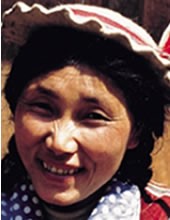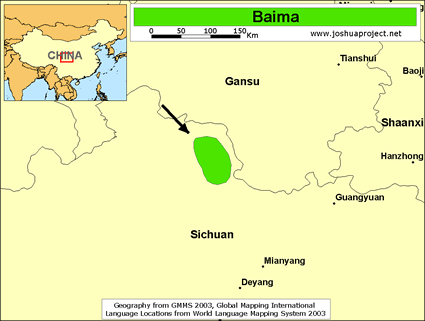The Baima have been counted as part of the Tibetan nationality, but they are clearly a distinct ethnic group that has little to do with Tibetans. They speak their own language, wear their own distinct dress, proudly maintain their own traditions and culture, and have never been followers of Tibetan Buddhism.
Before marriage, Baima youth are allowed to be sexually active. Once married, however, they must be faithful to their spouse. Divorce is considered a disgrace. After they are married, Baima women wear fishbone necklaces and hats made of goatskin and chicken feathers.
The Baima regard Lord White Horse as the greatest of all gods. Baima tombs are topped with small colorful flags – nine flags for a deceased male and seven for a female. It is said that these flags will lead the souls of the dead into heaven. The Baima also regard the rooster as among their protective gods. They say that at one time enemy troops were preparing to attack a Baima village in the middle of the night. A rooster crowed loudly and woke up the villagers who were then able to repel the attack.
The Baima have never been exposed to the gospel. Their cultural, linguistic and geographic isolation has blocked them off from the rest of the world. Even Chinese gospel radio broadcasts are unable to access the high remote mountains. It is possible that not one individual among them has ever heard the gospel. The Baima are a good choice for a church or agency wanting to focus on a largely untouched tribe.
Pray for the hearts of the Baima to be open to the gospel message.
Pray for workers who will go to the Baima and share the good news of Christ.
Pray for many Baima to put their faith in Jesus and for God to establish his church among them.
Scripture Prayers for the Baima in China.
Operation China, Asia Harvest, Copyrighted © Used with permission.
| Profile Source: Joshua Project |











